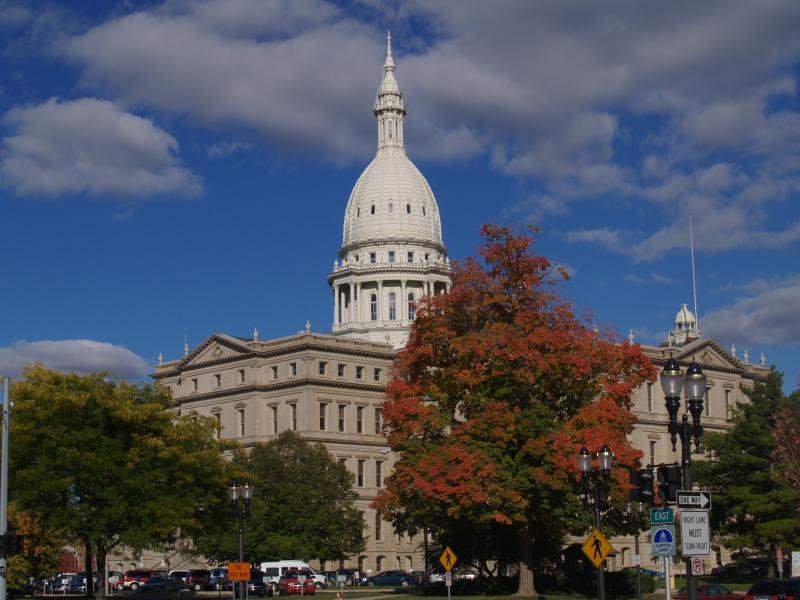
Michigan is at risk of becoming a failed state
3/9/2018
Michigan seems on course to become a failed state, argues Jack Lessenberry.
THE BLADE
Buy This Image

Lessenberry
DETROIT — Michigan is falling apart.
Last week, the legislature, with considerable fanfare, unanimously approved spending a new $175 million, most of the current budget surplus, to try to fix the state’s wretched roads. That may sound good to pothole-weary drivers.
Read last week’s column from Jack Lessenberry
But to anyone who knows anything about the real condition of the state’s roads, that is just “a drop in the pothole,” as Candice Miller, Macomb County’s public works commissioner, put in when the bill was passed March 1.
The tough winter and years of neglect have left the state’s roads so bad that drivers have been known to lose fillings out of their teeth as well as tires, wheels and axles to potholes. (The first three of those have happened to this columnist.)
For perspective on how little the $175 million is compared to the need, Jeffrey Cranson, director of communications for MDOT, the Michigan Department of Transportation, noted that more than a year ago, the governor’s 21st century infrastructure commission calculated that the state would need to invest $2.2 billion a year to get the roads back in decent shape.
That would include $1 billion in state funds a year for U.S.-owned freeways and bridges, like I-75; $600 million a year for other state highways and bridges and a final $600 million for other highly used roads and bridges under local control.
Today, those figures are also almost certainly too low. “Keep in mind they were calculating this in 2016, so the decline has continued,” Mr. Cranson said.
Roads are, in fact, like teeth: Fix a small cavity when it first appears, and the cost and discomfort are relatively small. Neglect the hole until you get an abscess and need a root canal and/or a crown, and it is highly painful and expensive.
That is essentially what Michigan has done.
The problem, and solution, in a nutshell, is this: Michigan desperately needs to raise taxes significantly in some way and use that money to improve not just roads, but the entire infrastructure, from bridges to broadband.
Unless that is done, and done relatively soon, Michigan will have no chance at being economically competitive or of attracting the new jobs of the future.
Amazon, the huge online mass market retailer, dismissed Detroit’s bid to provide a site for their second world headquarters, saying the area lacked adequate talent.
But beyond that, it is hard to imagine that Detroit, America’s only major city with no mass transit from downtown to the airport, could meet Amazon’s infrastructure needs.
Road repair is not the only reason the state is falling apart. Two years ago, Governor Rick Snyder commissioned a blue-ribbon panel of experts to study the state’s infrastructure needs; the legislature also added members.
In November, 2016, soon after the presidential election, they produced a comprehensive final report, still easy to find online, and which S. Evan Weiner, the group’s chair said the commission was “confident would serve as a 50-year-vision for improving the state’s infrastructure system and enhancing the quality of life for all Michiganders.”
By infrastructure, it meant not only roads and bridges, but “a larger and more complex picture that includes water and sewer systems, drains and stormwater systems, broadband and communications, and electricity and natural gas networks.”
Well-researched, carefully documented, the report began by documenting the sober reality of today:
They found that 39 percent of roads were in poor condition, and 27 percent of bridges are structurally deficient or functionally obsolete.
Rivers that drain 84 percent of Michigan’s Lower Peninsula tested positive for human sewage. That may be less surprising when you learn that an average of 5.7 billion gallons of untreated sewage flows into Michigan waterways every year.
That, in turn, may be in part because 10 percent of the state’s septic systems are experiencing operational problems.
Meanwhile, the Upper Peninsula has power plants that are wearing out, but there is little money to construct new ones.
“Without intervention — including adequate planning, management and investment, Michigan will continue to experience infrastructure failures” that are likely to get ever worse and worse, they concluded.
How much would it cost to get the infrastructure where it ought to be to make Michigan competitive? The commission came up with the whopping figure of $4 billion a year, not just for one year, but for the foreseeable future.
What’s worse is that Michigan brought this on itself. Virtually every state hasn’t spent what it should have on infrastructure needs, and neither has the federal government.
But Michigan was the worst of the worst. Nationally, states spent an average of 10.2 percent of their budgets on capital improvements — infrastructure needs — from 2010-14.
Ohio spent an average of 9.2 percent; Indiana, 9.9 percent. Michigan was dead last, with a paltry 6.4 percent, which the commission said was “partially a result of our unwillingness to identify and fund needed investments.”
After he got the report, the governor suggested the legislature establish a new state infrastructure fund, and deposit $165 million in it, a tiny fraction of what is needed.
But all the lawmakers would set aside was $5 million, about enough to fix one lane of a road for four miles.
Virtually nobody even suggested coming up with enough money to save the state. For one thing, many Republican lawmakers have taken a pledge not to raise taxes, no matter how great the need. All are also term limited.
None will be around to see the full consequences of their inaction. There has been considerable controversy over attempts to label certain countries “failed states.”
But that’s what Michigan seems on course to be.
Jack Lessenberry is the head of the journalism faculty at Wayne State University in Detroit and a former national editor of The Blade.